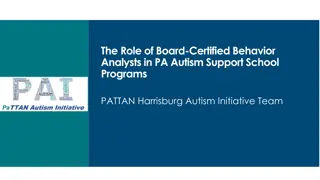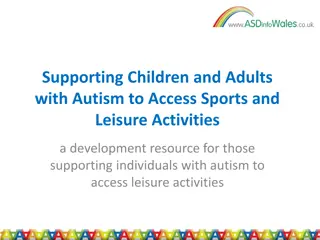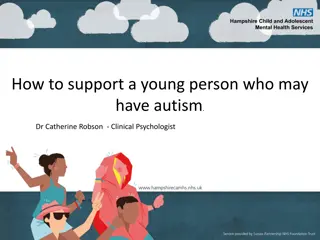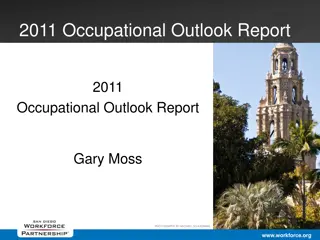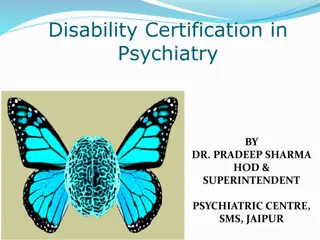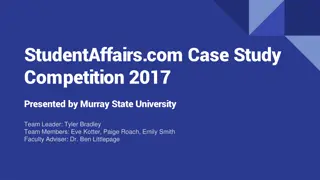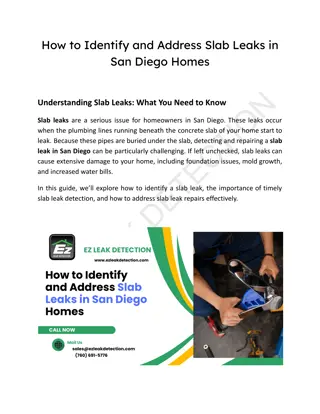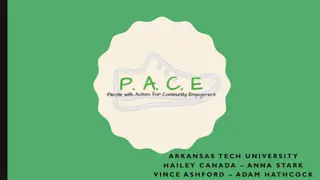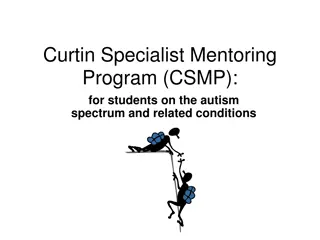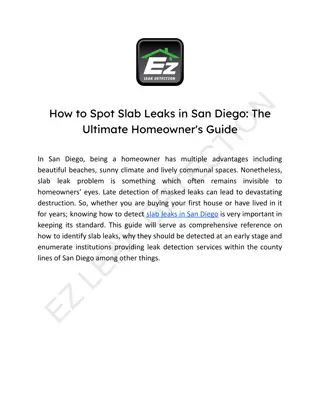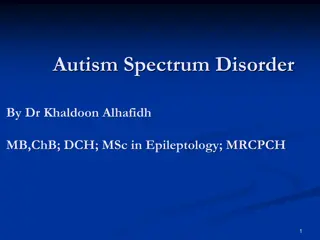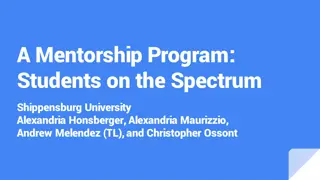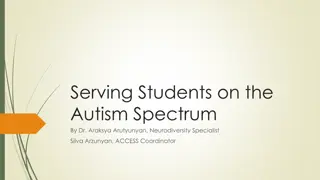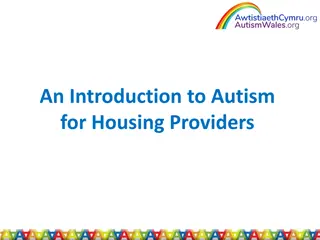Supporting Students on the Autism Spectrum at University of San Diego Case Study
People with autism spectrum disorders face ongoing social challenges, communication difficulties, and emotional regulation issues. The Disability Identity Development Model highlights the journey individuals go through in understanding and accepting their disability. The University of San Diego admits students with ASD and is exploring ways to support these students, including personalized admissions tours and dedicated resource centers.
Download Presentation

Please find below an Image/Link to download the presentation.
The content on the website is provided AS IS for your information and personal use only. It may not be sold, licensed, or shared on other websites without obtaining consent from the author.If you encounter any issues during the download, it is possible that the publisher has removed the file from their server.
You are allowed to download the files provided on this website for personal or commercial use, subject to the condition that they are used lawfully. All files are the property of their respective owners.
The content on the website is provided AS IS for your information and personal use only. It may not be sold, licensed, or shared on other websites without obtaining consent from the author.
E N D
Presentation Transcript
Supporting Students on the Autism Spectrum University of San Diego case study team: Linh Nguyen, Erin Fischer, David Horber
Understanding the Spectrum People with autism spectrum disorders often Have ongoing social problems that include difficulty communicating Become upset by being placed in new, stimulating environments Have difficulty regulating and expressing emotions Have trouble understanding another person s point of view and actions Have repetitive behaviors Rely on rigid routines Have limited and intense interests or activities
Disability Identity Development Model (Gibson, 2005) Passive awareness first part of life, but can continue into adulthood Have no role model of disability Taught to deny social aspects of disability Realization often occurs in adolescence/early adulthood Begin to see self as having a disability Hold self-hate and anger Concerned with how others perceive self Acceptance adulthood Starts to embrace self Begins to incorporate others with disabilities into life Involves self in disability advocacy Integrates self into able-bodied world
Admittance of Students with ASD CDC states that ~ 1 in 68 children have been identified with ASD Little research/tracking on acceptance rates for students with ASD Students meet academic standards for colleges admissions Students with high-functioning ASD most common on college campuses Colleges and universities with ASD-specific resource centers/programs take in ~ 20 to 30 new students per year Two years ago, we admitted 12 students on the spectrum This year, we admitted 21 students So what can we do to support these students?
Admissions Tour Without other students, so that they do not become as overwhelmed Provide individual campus tours for students with ASD and their families Actively seek out current students with ASD who have an interest in being a tour guide See Disability Services Center Ensure tour guides speak to ways students with ASD are supported throughout campus residence life, counseling services, academics, etc.
Orientation Program Building a close community amongst other students with ASD before integrating with the broader campus community Providing orientation session just for students with ASD and their families Staffing orientation with current students on the spectrum (orientation leaders, student panel, etc.) Social programming Interest-specific group activities Dialogues social engagement and level of comfort with social activities
Orientation Program Mental health counselors will meet with each student and their family Parents can find support from each other and the institution Parent/family-specific sessions at orientation facilitated by Residential Life, the Disability Services Center, and the Center for Health and Wellness Opportunity to decide whether or not they would prefer to live with others Would receive priority for single-rooms
Educational Sessions Bronfenbrenner s Ecological Systems Theory Intention is to introduce to faculty and staff a means of exploring the ASD experience and how it can evolve on campus
Educational Sessions Ableism and Allyship Acknowledging ableism and what we may take for granted Explore different ways of advocating for students on the spectrum Reflection on the language we choose to use and how it can impact students with disabilities Learn how to be more inclusive of this community i.e. Faculty will have the opportunity to consider how they can expand their teaching methods by providing detailed instructions and materials, finding alternatives to public speaking and group work, etc.
Educational Sessions Bystander Intervention Workshops Campus educational theatre troupe performs sketches depicting events where neurotypical students can intervene to create a safe space for students with ASD Audience interacts with theatre sketch by stopping the action and providing suggesting ways students can step in to prevent harmful outcomes Theatre troupe uses improv to show scene including audience suggestions Gives students visual examples of practical intervention
Disability Awareness Week Panel Collaboration of faculty, staff, and students speaking about what disabilities, including ASD, are and what steps the university is taking to support students with disabilities Exhibit Effort to engage students across campus to create and share information and experiences Multimedia experience in the form of art, videos, poetry, prose, etc. Tabling Distribute materials and engage the campus in activities (i.e. trivia games) Address from the President Participation through a campus-wide e-mail and DAW activities
Peer Mentoring Program Recruitment is open to all students. Current students on the autism spectrum are highly encouraged to apply. Peer mentors will receive training on how to: Perform bi-weekly check-in s and monitor student progress Help students organize their academic plans Set up tutoring appointments and suggest campus resources Coordinate social events and activities in collaboration with other groups Including centers, departments, student organizations, etc. Empower students with ASD to advocate for themselves
Tutoring Training session for tutors interested in learning how to work with students on the spectrum Provide an understanding of their unique academic needs Learn how to holistically support this student population Acknowledge that those on the spectrum have strengths and areas of growth that can be worked on at the tutoring center Provide consistent and structured opportunities for students to receive academic support
Workshops for Students with ASD Students with autism spectrum disorder may struggle with life skills and executive function. Time Management Students will discover useful time management strategies to help them accomplish tasks and stay organized Study Skills Students will learn different techniques to productively and effectively complete class assignments and prepare for exams Self-care Students will explore what methods of handling sensory overload and other stressors work best for them
Mental Health Check-Ins Weekly check-in s with a mental health counselor from the Center for Health and Wellness To provide consistency, students will be asked to attend weekly meetings for their first 2 months on campus Afterwards, they will be given the option to stop or continue the meetings Monthly group sessions Students on the spectrum can voice their difficulties and experiences transitioning to college to one another Students are encouraged to advocate for themselves and schedule meetings
Budget Transition Programs for Students with Intellectual Disabilities (TPSID) initiative started in 2010 by U.S. Department of Education 27 colleges and universities were given 5-year federal grants of $500,000 to create TPSID programs In 2015, $9,800,000 was allocated for 27 new awards
Budget Two-day Orientation 5 orientation leaders: $500 3 janitorial workers: $576 5 dining services workers: $720 Food: $1,890 Peer Mentoring Program 4 peer mentors: $14,700 Social events: $650 Training for Tutors Lunch for sessions: $400 Disability Awareness Week Exhibit materials: $150 Tabling materials: $200 Total: $19,786
Resources and References Along the Autism Spectrum, A Path Through Campus Life Cadabam's Hospitals CDC- Data and Statistics Disability and Clinical Competency: An Introduction Educational Theatre Company Emerging Practices for Supporting Students on the Autism Spectrum in Higher Education Expanding the Paradigm: Postsecondary Education Options for Individuals with Autism Spectrum Disorder and Intellectual Disabilities Going to College with Autism Identifying the Unmet Needs of College Students on the Autism Spectrum Individuals within Social Context Kent State- Autism Spectrum Disorder Resources for Students More Colleges Expanding Programs for Students on Autism Spectrum NIMH - Autism Spectrum Disorder Students with Autism in the College Classroom Study Skills | Student Academic Success Center Supporting Students With Asperger Syndrome on College Campuses U.S. Department of Education
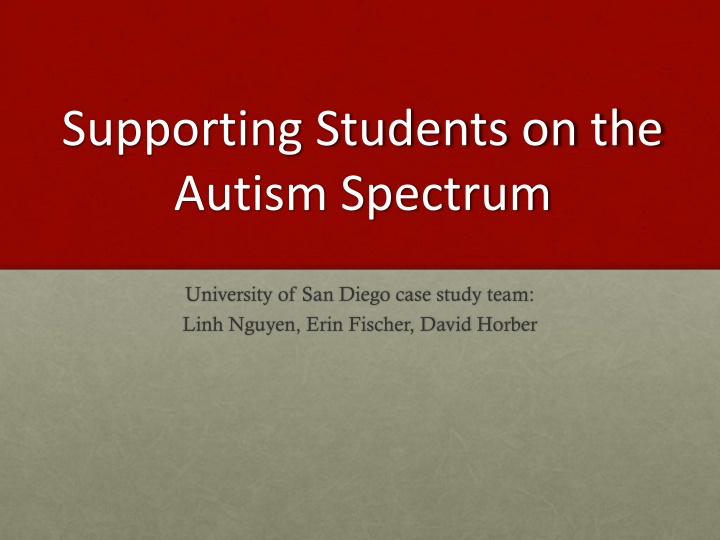

![(❤Read⚡) [✔PDF✔] The Best Travel Guide - San Diego: A Cicerone’s View of To](/thumb/68088/read-pdf-the-best-travel-guide-san-diego-a-cicerone-s-view-of-to.jpg)


